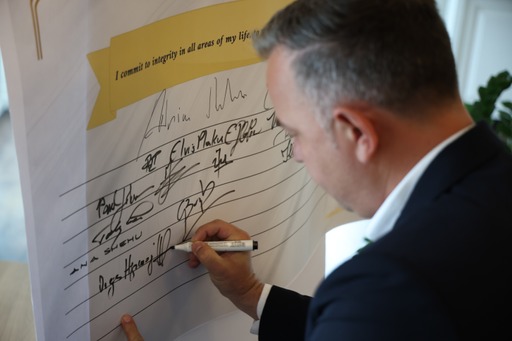“I’m not the same person I used to be.”
Call him Ismail.
He’s a leader of a small business. He’s in his 30s. I’ve renamed him after one of my favorite authors, Ismail, to protect his identity.
“Josh, I’m not same person I used to be,” Ismail said when he first asked me to coach him. We began working together. Here’s what happened over the next few months:
- Ismail started with goals for himself as the head of his organization.
- He opened up and told me about work and personal challenges.
- Ismail made himself accountable to me—the changes he wanted to make were changes he had initiated.
- When we met, our sessions involved work performance progress, and the impact personal relationships had on work.
A few months later, he told me, “Josh, I’m not same person. The new Ismail is better than the old one.”
Ismail had returned with compassion and empathy to care for the people in his organization.
What about you—what benefit might an ongoing accountability conversation have for you?
The Benefits of an Accountability Partner
In other posts, I’ve talked about how people have provided accountability for me. Here are some of the ways an accountability partner might benefit you. This person could
- Help keep you on track with your goals.
- Provide a place to reflect on how to overcome obstacles that may be holding you back.
- Encourage you when you become weary. I remember rounding the leg for the last bend in the 800-meter dash. It changed everything to know the people shouting were routing for me.
- Provide you with fresh perspectives.
- Help you identify blind spots. You don’t know what you don’t know. And you might never know it without letting someone on the inside to tell you.
If you’re convinced that you need an accountability partner, what steps might you take to pursue this type of relationship?
5 Steps to Finding an Accountability Partner
Finding the right accountability partner will likely require some effort and intentionality.
You want to find someone who is supportive, trustworthy, and committed to helping you achieve your goals. That person might be a colleague sitting next to you at work, or it could be a friend you meet for coffee after work.
There’s also a good chance that it’s not either of those people.
Zeke Swift, a mentor of mine, says something like this, “Every system is perfectly designed to produce the output of that system at any given moment.”
If the system of your life isn’t producing the goals you want, you probably need to change something related to the system.
If you’re ready to start, here are some steps you can take to find a person, who is a good fit.
Step 1. Define Your Goals.
Start by defining your goals and what you hope to achieve through the accountability relationship. This will help you identify the qualities you are looking for in an accountability partner. If your goals have to do with career advancement, are you looking for someone who has already gone down the path you want to follow? Or are you looking for someone at the same phase you are?
Step 2. Reach Out to Your Network.
Let people know that you are looking for an accountability partner. Be clear about what you want to accomplish and what your expectations are. See more below about what you might say at this point.
Step 3. Interview Potential Partners.
Interview potential accountability partners to get a sense of willingness to support you and whether they seem to be a good fit at this time. Ask them about their own goals and what they hope to achieve through the relationship.
Step 4. Establish Expectations.
Once you have found the right person, establish clear expectations for what the relationship will look like. This includes items like how often you will meet, what you will discuss and who pays for coffee or lunch. I’m a big advocate of paying if I’m the one asking for the meetings.
Step 5. Re-evaluate Regularly.
It’s important to re-evaluate regularly to ensure that the accountability relationship continues to function well. If you find it’s not working and have tried to address the dysfunction, the best option is to end it.
Why the Person you ask Might Say “No”
If the concept of an accountability partner is new to you, the idea of interviewing someone to be an accountability partner might feel scary.
I can imagine you would have some fear of rejection as you pick up the phone to invite someone to the interview.
Here’s some advice: Be as clear as possible about what you want.
I’ve had people reach out to me for accountability. And I’ve reached out to others.
When the answer is “no” or “I’m not sure I’m the right fit,” here are some common threads.
“I don’t have the time”
About ten years ago, I wrote a professor and said, “Dr. Park, could you mentor me as I seek to grow more in understanding the dynamics of racism and privilege?”
He politely declined and offered to have a phone call instead. We had the call, and I thanked him.
Looking back on this, I realize that my request sounded like an open-ended time commitment, which he couldn’t make.
What do you think his response would have been if I had asked for a quarterly call for one year – four 30-minute conversations?
“Not A Good Fit”
“Not a good fit” can mean anything from “I don’t want to work with you, and this the most positive spin I can put on it” to “This request doesn’t fit with my over goals, vision, or values.”
This is why you do your homework.
People love mentoring others and providing accountability in their areas of expertise and interest.
You’ll learn valuable lessons if you get a “no” for either of these reasons or others. Keep making the asks until you find the right person.
Your First Meeting
You’ve reached out to your network and identified someone who is a good fit.
What does the first meeting look like?
In addition to confirming expectations at the first meeting, here’s how I’d recommend structuring the conversation:
- Goals. What do you commit to doing, and when will you do it? You can answer this question for work, health, love relationships, spiritual life, or any important goals.
- Obstacles. What obstacles and challenges might you encounter?
- Actions. What steps do you need to take to overcome any obstacles?
After this initial conversation, the next meeting begins with the question, “How did it go?” or some variation.
If you reach the goal, you celebrate success together!
If you did not reach your goal, your accountability partner can help you explore what happened when you did not achieve your intended purpose.
What’s next for you?
As Ismail’s experience demonstrates, having an accountability partner can be a transformative experience.
By committing to a supportive and productive accountability relationship, you can achieve your goals and become a better version of yourself.
As you continue on your journey, consider joining us at the upcoming Leadership Forum event to connect with like-minded individuals and continue growing together.
Remember, finding the right accountability partner takes time and effort, but the results are well worth it!
So, take a step towards your goal today.

